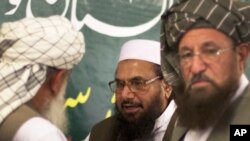The Pakistani government says it needs "concrete evidence" to move legally against the founder of the militant group blamed for the 2008 Mumbai attacks, a day after Washington posted a $10 million bounty on him.
Pakistan's foreign ministry spokesman Abdul Basit said in a statement Wednesday that Islamabad would prefer to receive evidence against Hafiz Mohammad Saeed than to engage in a public discussion on the issue.
| Top U.S. Rewards for Justice Bounties |
|
In a statement, Basit said that "in a democratic country like Pakistan, where [the] judiciary is independent, evidence against anyone must withstand judicial scrutiny."
Hours earlier, Saeed held a news conference near Pakistan's military headquarters in Rawalpindi, where he publicly taunted the United States.
He said that America should give the reward money to him. He mocked Washington for placing a bounty on someone whose whereabouts are well known.
The 62-year-old founder of Laskhar-e-Taiba operates openly in Pakistan, appearing on television talk shows and regularly giving public speeches. Saeed and his extremist organization stand accused of masterminding numerous terror attacks, including the one in India's financial hub four years ago that killed 166 people, including six Americans.
Pakistani authorities held Saeed under house arrest for about six months after the 2008 Mumbai attacks. He was later released, without charge. Pakistan’s Supreme Court said there was insufficient evidence to detain him
In recent months, Saeed has used his high-profile status to help lead a protest movement against Pakistan reopening its border with Afghanistan for NATO supplies. Authorities had closed the border to NATO forces as part of their response to a coalition air strike last November that mistakenly killed 24 Pakistani soldiers.
Meanwhile, not far from Rawalpindi, U.S. Deputy Secretary of State Tom Nides met with Pakistani officials in the capital Islamabad. His trip is aimed at repairing diplomatic relations following last year's border incident and the covert U.S. raid into Pakistan that killed al-Qaida leader Osama bin Laden.
Pakistan's parliament is currently debating a new framework for ties with Washington in light of recent events.




